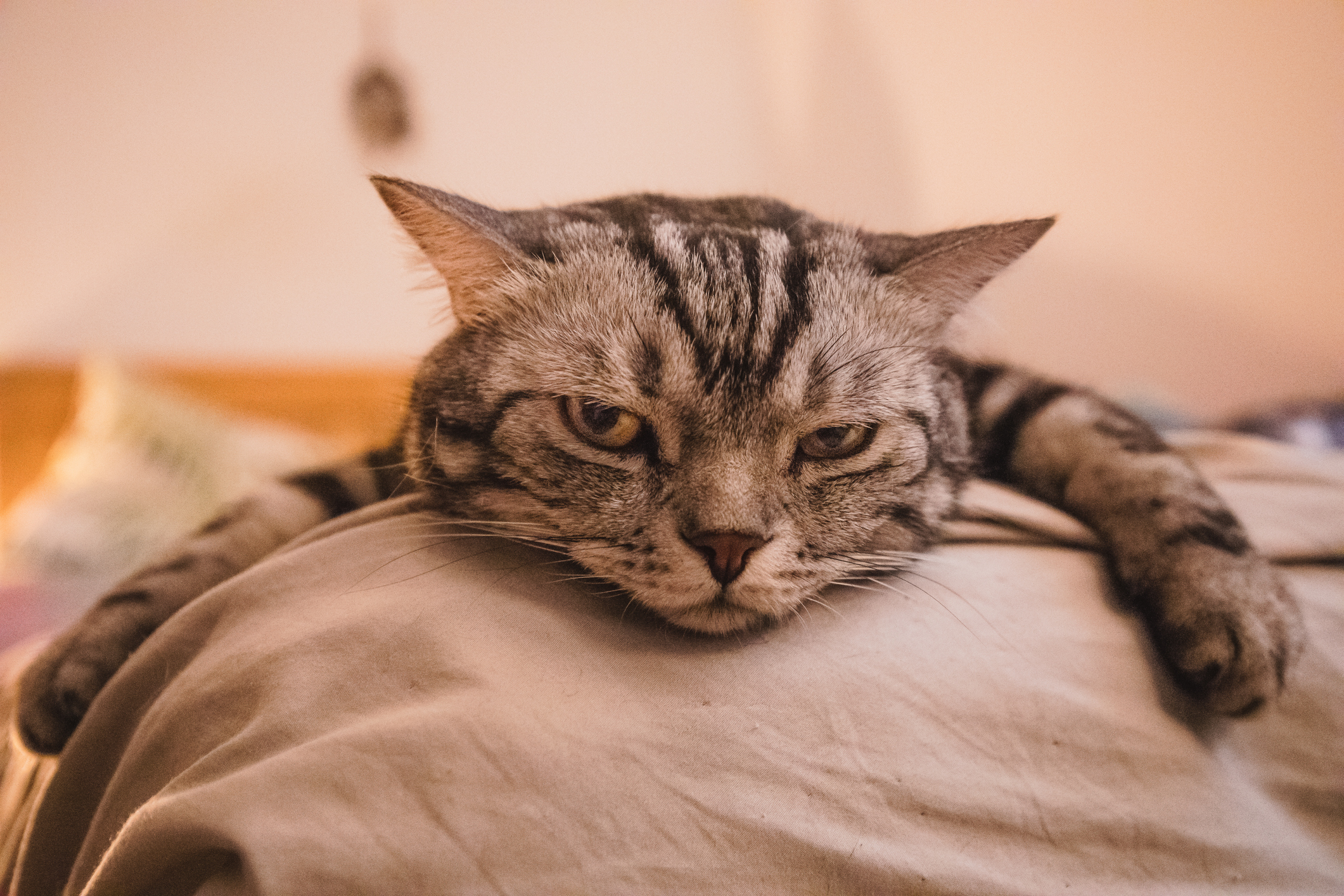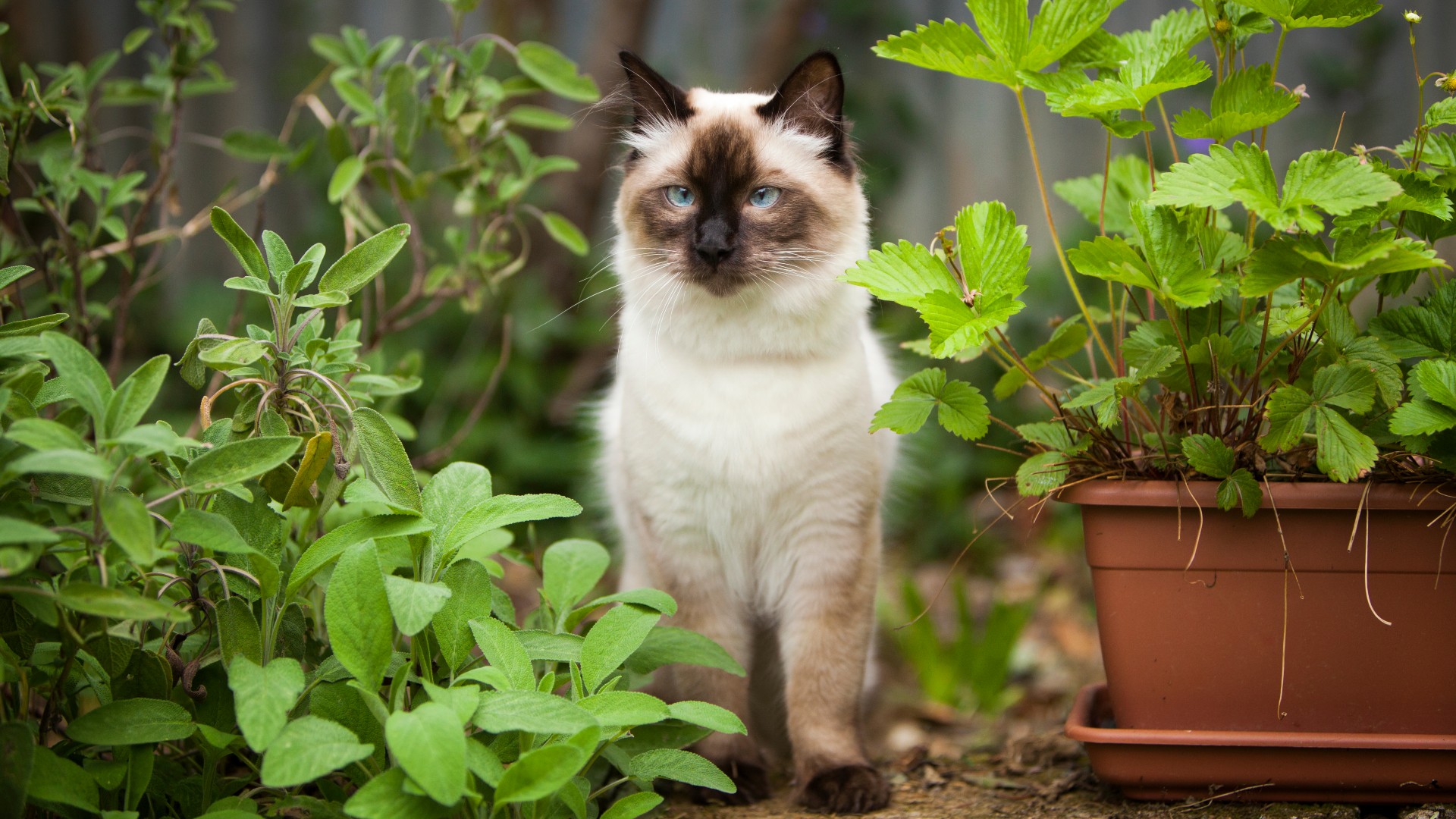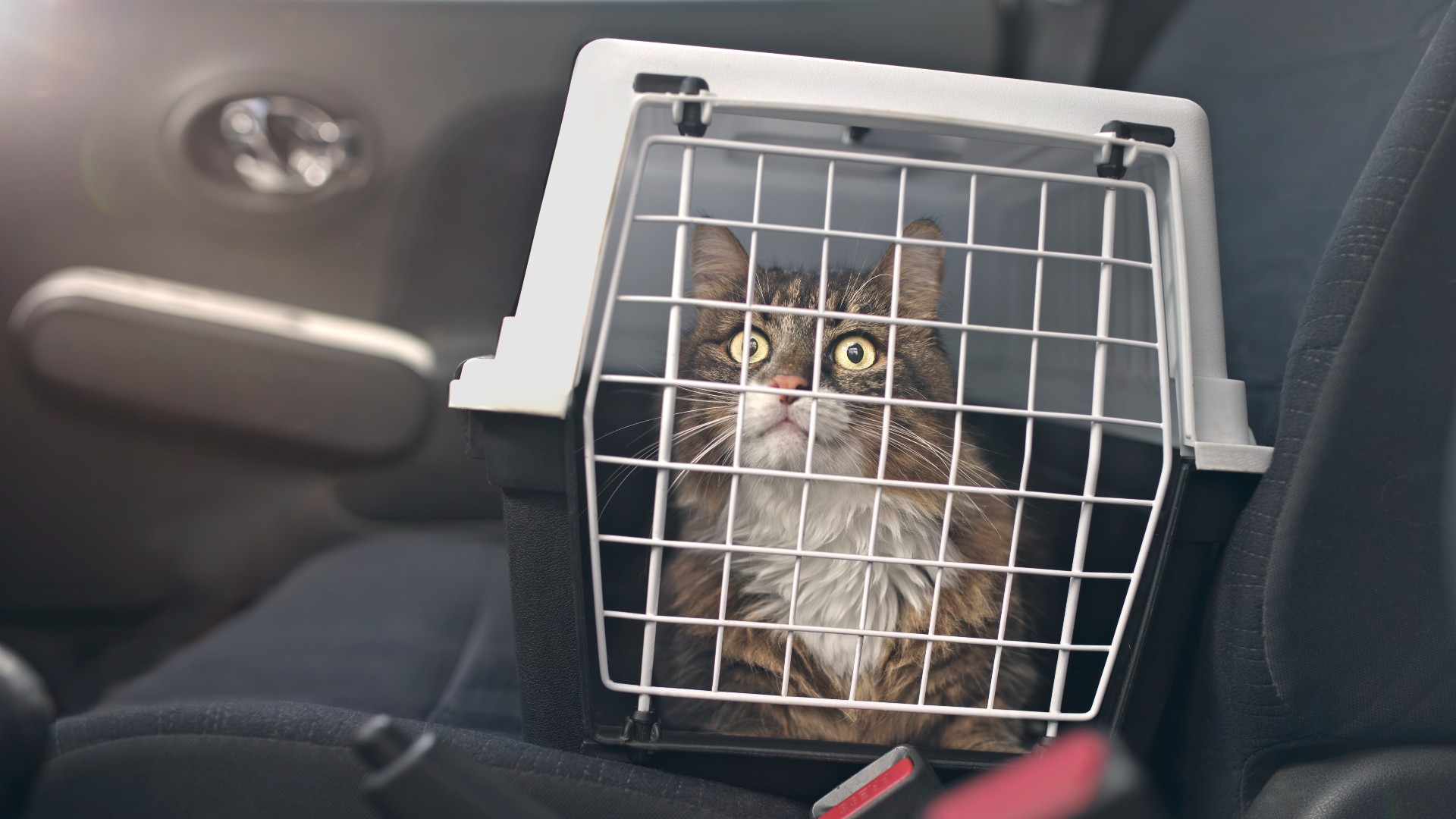What do cats hate? A quick guide to keeping your kitty content
What do cats hate and why do they hate them? Here's our rundown on what to avoid to keep your feline friendly

It's important to know the answer to the question 'what do cats hate?' to keep your kitty carefree and calm, and to ensure you build as a strong a bond as possible between you and your furry friend. No one wants to do something accidentally to annoy their feline companions, so here's a quick rundown of a few things you can avoid doing which are known causes of cat distress. And some reasons why they annoy your kitty so much.
Unlike humans, cats can’t sit us down and explain to us all the things we’re doing that are driving them crazy. Instead, cat communication is more complex, and the way they express their likes and dislikes can easily go unnoticed by those of us that aren’t well versed in kitty lingo.
If you’ve ever found yourself looking at the back of your cat as they haughtily hightail it off into another room after an unknown discretion on your part, then you’re likely familiar with how much work it can take to get back into their good graces.
The good news is, you can avoid being on the other end of your cat’s withering looks by understanding a few of the things that cats hate. Tuck these gems away in your back pocket and you’ll find yourself spending more time on the right side of your feline friend.
Why do cats hate water?
Cats evolved in dry or arid environments, so they were not designed to deal with large bodies of water like rivers, seas or bathtubs. If they do get wet, their heavy fur coats mean the water weighs them down reducing their normal ability to skedaddle from situations they find stressful. Water, especially from the tap, will also contain chemicals that your kitty's sensitive nose can detect. They don't want their coats to be immersed in a liquid smelling alien to them and which could hide their natural musk.
Another reason why cats hate water is that they had an adverse experience with water in the past. If their first experiences of bath time were stressful, they will do all they can to avoid it in the future. Add to that the possibility that they may have been deterred from a neighbor's garden with a liberal drenching from a hose, and its's easy to understand why water is something they have learned to hate.
Why do cats hate dogs?
Cats and dogs evolved to be very different species and this means that although they can get along, there are a few innate behavioral barriers to overcome. Both are carnivorous, so in the wild they would compete for similar food sources, and dogs may even see cats as prey, hence their tendency to chase them.
Get the best advice, tips and top tech for your beloved Pets
Furthermore, dogs are pack animals that will defer to the most dominant individual in their group, meanwhile cats are lone predators. This means dogs will give way to larger animals, but if a cat has decided to fight for their food or territory they are a lot less likely to back down. This difference in attitude can lead to loud and angry conflicts when they do clash.
And talking of attitude, the other reason they may fight stems from the different ways they approach meeting a new animal. Dogs tend to be instantly friendly and investigative, while cats prefer to take time to assess the situation before deciding whether something is friend or foe. This makes cats react aggressively to a dog's in-your-face playfulness.
This is why it's so important to introduce dogs and cats to each other slowly and over time, ideally with a barrier between them. Cats need to have a place to escape from the unwanted affection dogs can instantly show them. Providing your cat with a high cat tree, or putting your dog behind a barrier will give them the time to get used to each other.
What sounds do cats hate?
Cats do not like loud noises. Much like their human counterparts they can get stressed when exposed to shouting, or other loud noises like fireworks and thunderstorms. According to Vetstree they can pick up noises at higher tones than humans or even dogs.
Cats can hear sounds about 1.6 octaves higher than humans and one octave higher than dogs, which can drive them crazy and cause them to retreat to quiet spaces. Excessive or loud noises, such as vacuum cleaners or a kettle boiling, cause what is known as acoustic stress, so it’s important to be mindful of sound when your kitty is in the room.
We can’t always avoid loud noises, but there are some things you can do to minimize potential distress to your kitty. If you’re going to be vacuuming or hosting a gathering, consider shutting your cat away in another room. Move their cat bed in there and create a relaxing retreat away from the hustle and bustle. Lower the volume of the TV if your kitty is nearby, keep them away from washing machines and dryers, and bring them inside during firework season.
- How to get cats to get along
- Do cats dream? What do they dream about?
- Why do cats play with their prey?
What smells do cats hate?

If you’re wondering why your cat always flees the room every time you burn essential oils or start spritzing the kitchen with citrus-scented cleaning products, it can be helpful to know that one of the things that cats hate is intense odors.
A cat’s sense of smell is roughly 14 times more sensitive than ours, so what smells pleasing to our nose can be a major source of irritation to theirs. By learning which scents they can’t stand, you can avoid upsetting your kitty and make your living environment a pleasant space for both of you.
Here are a few of the scents that your cat might be averse to:
- Cigarette smoke
- Cleaning products
- Scented litter
- Citrus fruits
- Certain herbs - rosemary, mint, and thyme in particular
- Some essential oils - lavender, geranium, and any menthol scent
- Spices - especially pepper, cinnamon, and chili
While you may want to avoid the above where possible, knowing what smells your kitty hates can also come in handy. If you’ve invested in one of the best cat scratching posts and still find your cat prefers attacking your furniture, spritzing it with a scent they don’t like can act as an excellent deterrent.
Cats hate change
Just like most humans, cats are creatures of habit who don’t do well with change. Whether it’s something seemingly minor, like swapping their cat litter over to another brand, or a big change such as welcoming a new baby into the family or moving house, any change in their environment or daily routine can cause them to stress out.
According to a study conducted by researchers at Ohio State University, sudden changes can cause cats to pretend to be sick as a way of letting their owners know they’re upset. The experiment showed that cats who experienced disruptions to their routines were three times more likely to act sick than cats who didn’t experience change. Common behaviors included urinating or defecating outside the litter box, vomiting, and decreased food intake.
Cats hate change for many of the same reasons that we do. Change can bring with it a feeling of loss of control, a fear of the unknown, and a perceived loss of status if a new cat or human has entered their territory.
While change is a normal part of life, knowing that it freaks your kitty out as much as it might freak you out, can help you be more sensitive to their needs. Where possible, introduce new changes slowly to give them time to adjust, maintain comforting routines, and use play as a form of therapy. The best interactive cat toys are particularly good for keeping your kitty engaged and distracted during times of change.
Why do cats hate car rides?

You may have heard of the puppy cat phenomenon, which sees some felines acting like their canine companions. Swimming in the sea, hiking in the mountains, and enjoying the wind whipping through their whiskers during a car ride is common among certain breeds, such as Bengals, but for most of our feline friends, it’s a big no-no.
It only takes a short drive to the vet’s office for most pet parents to figure out just how much their cat hates being in the car. Meowing, urinating, or even vomiting, are all signs of stress and anxiety, and while your kitty does need to buckle up now and again, for most breeds you want to avoid unnecessary car trips.
When you do need to take a car trip with your furkid, wrap them in a cozy blanket before putting them in their carrier and cover the carrier with another blanket to make it dark. This helps create a more secure environment by limiting stimuli that can cause stress and anxiety, leading to a calmer cat.
Why do cats hate tummy rubs?
Who doesn’t love a tummy rub? If you’ve ever found yourself thinking this while trying to roll your kitty onto their back so you can give them some tummy love, then you might not know that our feline friends aren’t into this form of affection as much as we think they are.
Unlike dogs, who love nothing more than a good belly rub, cats are quite happy to go without. According to Lena Provoost, an animal behaviorist at the University of Pennsylvania School of Veterinary Medicine, the hair follicles on the belly are hypersensitive, so petting them there can be overstimulating. But that’s not the only reason.
“Many people think that when cats roll over on their backs, they’re acting like dogs — that they’re showing submission,” says Dr. Cindy Houlihan, “But it’s actually a defensive position.” It turns out that in the wild, cats roll onto their backs when they can’t flee from a fight and want to be able to use their claws and teeth to protect themselves from predators.
While that may explain their behavior in the wild, why would they act the same way with someone who they surely know loves them? According to Houlihan, it’s a trust test. “The abdomen is a vulnerable area for cats because that’s where all of their vital organs are located,” she says. “So exposing it is a form of communication — they want to see what you might do.”
Suss your kitty out slowly by first admiring them when they’re lying on their back without reaching to touch them. You can slowly progress to stroking one of their front paws and if that gesture is accepted, you can try to touch their tummy. It’s a huge compliment if your cat lets you stroke their belly, but don’t be offended if they don’t allow it. Every cat is different and the most important thing is to respect their boundaries.
Want to learn more about your feline friend? Then you'll love our pieces on why do cats like to knock things over? and 10 facts about cats that you never knew.

Kathryn is a freelance writer who has been a member of the PetsRadar family since it launched in 2020. Highly experienced in her field, she's driven by a desire to provide pet parents with accurate, timely, and informative content that enables them to provide their fur friends with everything they need to thrive.
Kathryn works closely with vets and trainers to ensure all articles offer the most up-to-date information across a range of pet-related fields, from insights into health and behavior issues to tips on products and training.
When she’s not busy crafting the perfect sentence for her features, buying guides and news pieces, she can be found hanging out with her family (which includes one super sassy cat and a kitten), drinking copious amounts of Jasmine tea and reading all the books.
She has written for a range of publications, including Fit&Well, Top Ten Reviews, LiveScience, Goodto, and Product Hunt.
